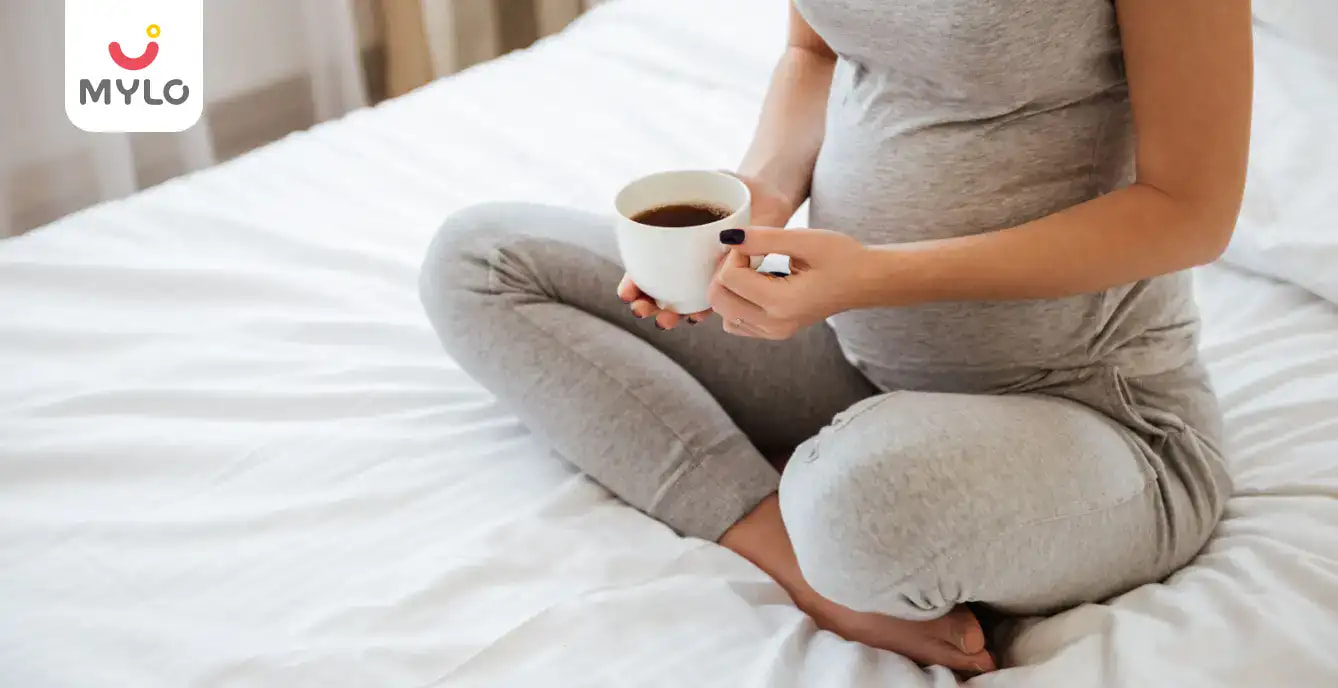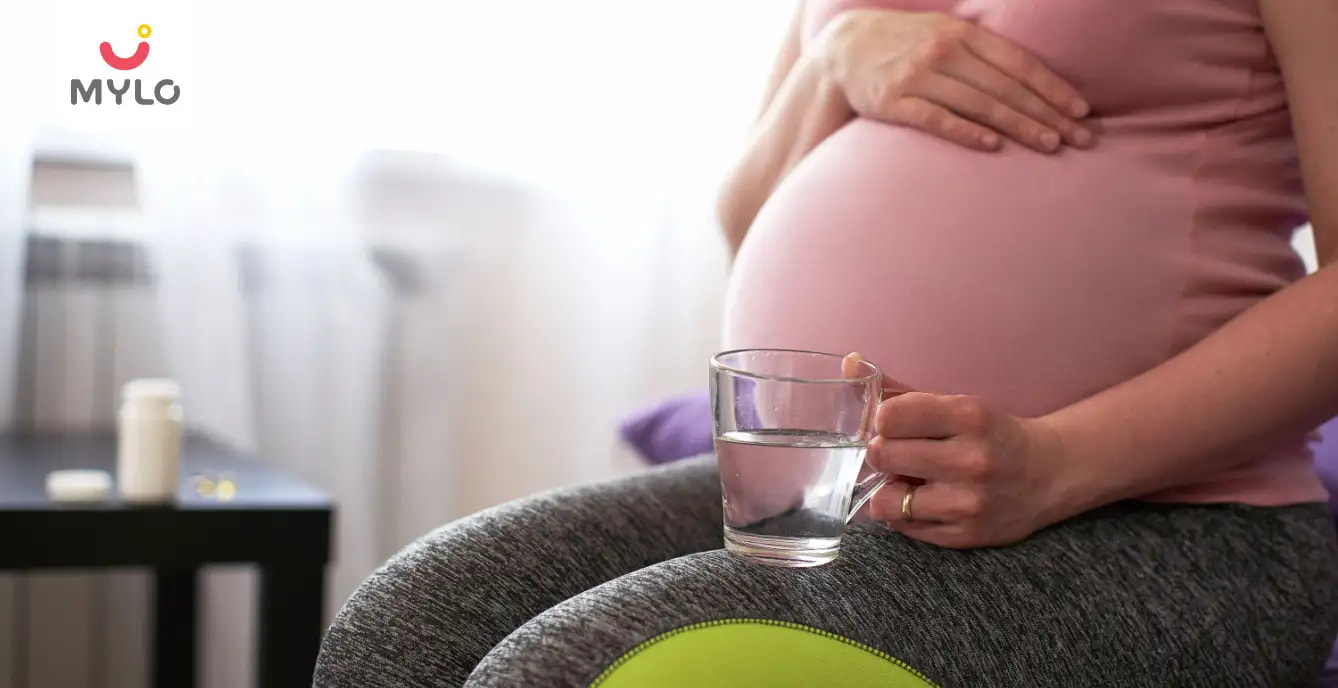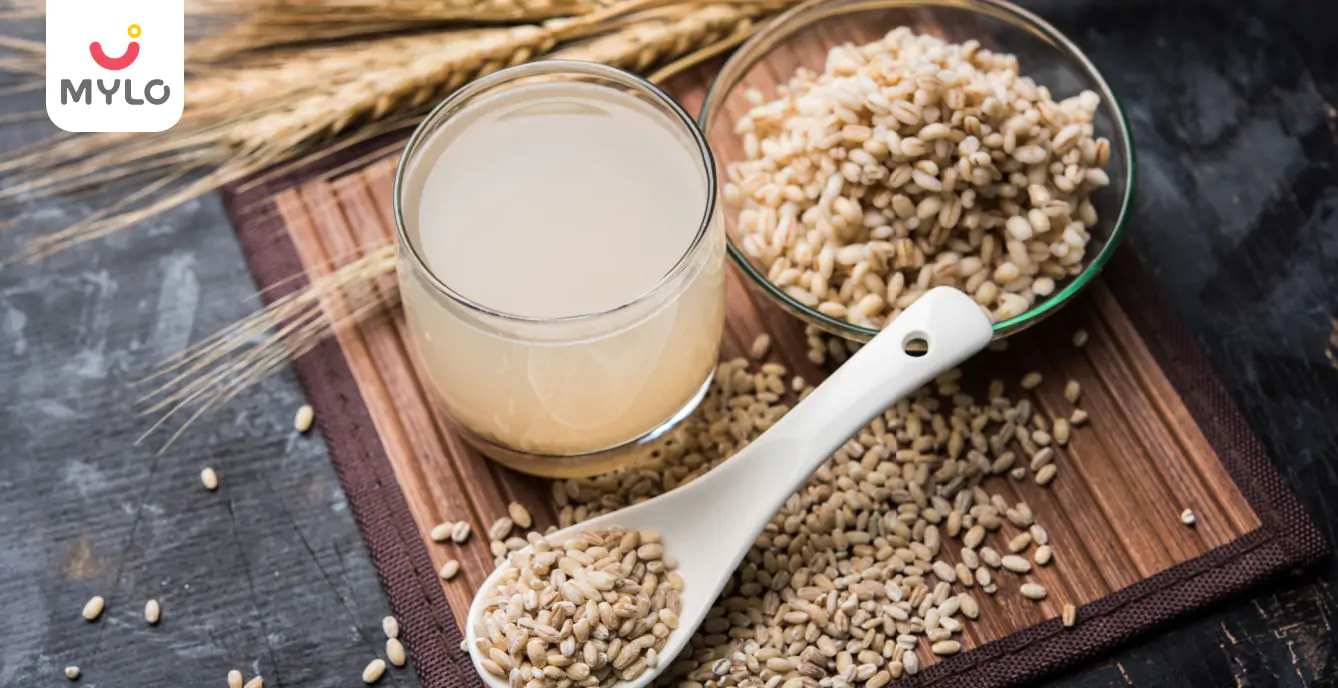Home

Pregnancy Precautions

Green Tea During Pregnancy: Benefits, Risks & Safety measures
In this Article
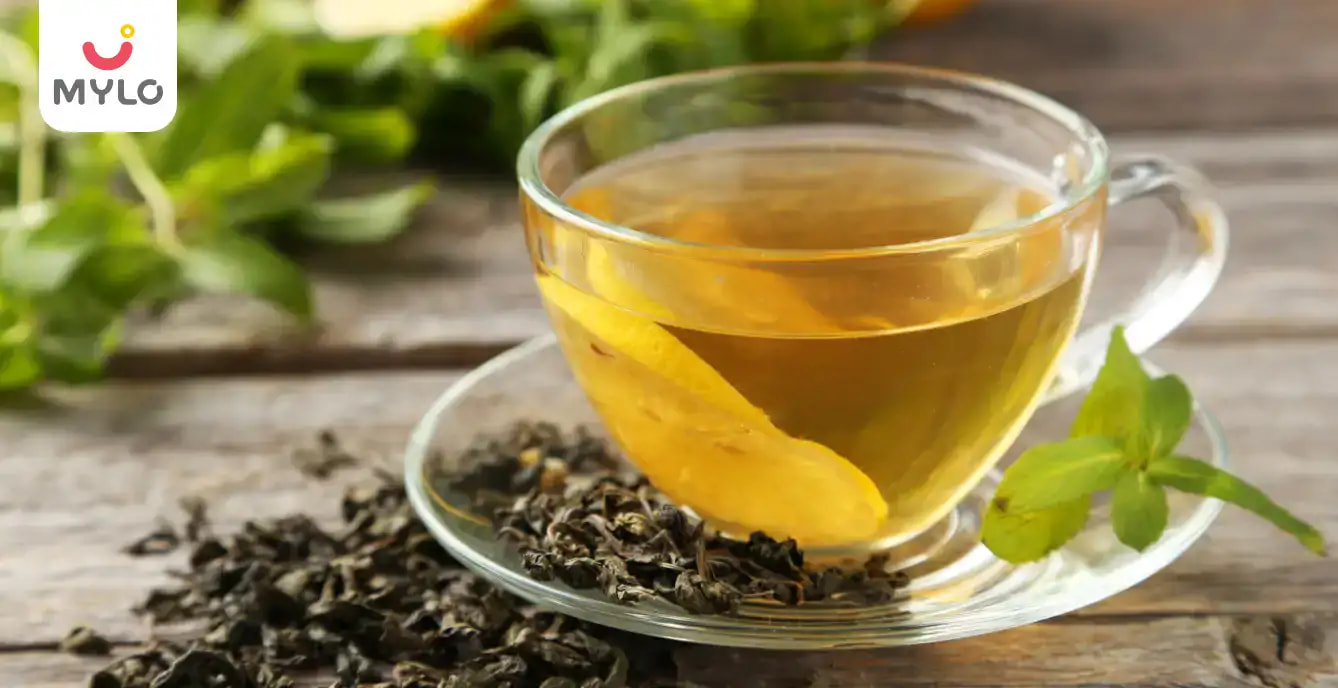
Pregnancy Precautions
Green Tea During Pregnancy: Benefits, Risks & Safety measures
Updated on 30 January 2023
Green tea is one of the best beverages you can drink for your health, whether pregnant or not. This drink is equally satisfying, hot or cold, providing health benefits without the need for calories or artificial sweeteners. Green tea during pregnancy may seem like a great idea to many expectant mothers because it provides hydration and a change of pace from plain water. As long as you monitor your intake, it's a viable option. This article will potentially talk about how green tea can be beneficial during pregnancy.
Women are encouraged to consume plenty of water and other healthy fluids while pregnant. During pregnancy, it's best to drink 8 to 12 glasses of water daily because it helps the placenta and amniotic fluid grow. But it's also vital to avoid caffeinated beverages like coffee, which can cause dehydration and cancel out the benefits of water.
The leaves of the Camellia Sinensis plant are used to make green tea, which has a subtle, earthy flavour. Its high antioxidant content has earned it a reputation as a beneficial beverage.
What Exactly Is Green Tea?
Green tea is not herbal because it comes from the same plant as regular black tea. It has caffeine, like coffee, but in lower concentrations. Polyphenols, the antioxidants found in green tea, are particularly potent. Antioxidants protect your cells' DNA from being harmed by free radicals. Because of its high water content, green tea has nearly no calories per serving.
Is Green Tea Safe During Pregnancy?
Green tea drinkers often wonder if the health benefits of green tea may be enjoyed during pregnancy. As with any meal or drink, however, green tea can be dangerous if drunk more than what is considered safe. Green tea is safe to drink as a stimulant during pregnancy if used in moderation. It is recommended that pregnant women drink no more than two cups of green tea every day.
Since green tea may lower folic acid or folate levels, it's best to avoid it during the first trimester of pregnancy. Safe consumption of green tea during pregnancy requires limiting daily consumption to no more than two cups, even in the second and third trimesters.
Can pregnant women drink green tea? Somewhat, in some circumstances. Since green tea may lower folic acid or folate levels, it's best to avoid it during the first trimester of pregnancy. Even if you're already over the first trimester, you shouldn't drink more than two cups of green tea every day for your and your baby's sake.
Caffeine is present in green tea, albeit in considerably lower concentrations than in coffee. The caffeine content in a standard 8-ounce cup of green tea (236 ml) ranges from 25 to 45 mg, depending on how strong the tea is brewed, while a standard 8-ounce cup of coffee contains anywhere from 95 to 200 mg. Consequently, green tea should be consumed by pregnant women in moderation.
Does Green Tea Contain Any Caffeine?
The amount of caffeine in an 8-ounce (oz) cup of green tea can range anywhere from 24 to 45 milligrams (mg), depending on how strong the tea was prepared.
On the other hand, the amount of caffeine in an 8-ounce serving of coffee can range anywhere from 95 to 200 mg, depending on the brand. To put it another way, caffeine in a cup of green tea is far lower than in a cup of regular coffee.
Caution is warranted, however, because even decaffeinated coffee or green tea still contains trace levels of the stimulant caffeine in each serving (12 mg or less).
Health Benefits Of Green Tea In Pregnancy
Is green tea good for pregnant women? This is one question many women ask themselves during their pregnancy. You would be happy to know that consuming one or two cups of green tea daily is deemed safe for pregnant women. As an expectant mother, here are the most important benefits you should be aware of:
-
Pregnant women with hypertension are at increased risk for a severe illness called preeclampsia, which can threaten the pregnancy. Pregnant women can benefit from green tea because it effectively lowers blood pressure.
-
Green tea's high antioxidant content helps neutralise harmful free radicals before damaging healthy cells. Antioxidants in the diet can prevent cancer, high blood pressure, heart disease, etc.
-
Pregnancy-related mood swings can be mitigated by drinking green tea, which has antioxidants that boost the body's metabolism. Clinical research indicates that green tea helps boost regulatory T-cells in the body, which are essential for maintaining a healthy immune system. With this method, you can protect yourself and your unborn child from harmful bacteria and viruses.
-
Pregnancy is associated with an increase in the prevalence of digestive issues. Tea made from green tea leaves can aid with digestion.
-
In lab studies, green tea has been shown to improve oral health and bone density. Gingivitis is common in pregnant women because of the changes in hormone levels. Drinking green tea can help.
Risks Of Drinking Green Tea During Pregnancy?
You should be aware of a few potential adverse effects of green tea before drinking it while pregnant. If you prefer green tea and want to keep drinking it throughout pregnancy, you should talk to your doctor or gynaecologist beforehand.
-
Pregnant women who drink green tea may have less iron delivered to their cells. It is impossible to make haemoglobin without iron. This may contribute to the development of gestational anemia, a condition in which the body's ability to absorb nutrients and oxygen is compromised.
-
Pregnant women need to have enough folic acid because it helps prevent birth abnormalities in the baby's brain and spine. Spina bifida is a birth condition caused by a lack of folic acid, which is impaired by drinking too much green tea. Green tea should be avoided in the first 12 weeks of pregnancy when your body needs folic acid the most.
Safety measures
When indulging in green tea during pregnancy, keep in mind the following:
-
Green tea includes tannins that may produce acidity, which can further contribute to nausea, constipation, and stomachache; thus, it's best to avoid drinking it before a meal.
-
Don't drink it with food because it can dilute your stomach acid and prevent your body from absorbing iron.
-
Green tea should not be consumed within two hours after a meal.
-
Green tea is fine, but you should drink at least two cups every day.
-
If drinking green tea in the evenings or before bedtime disrupts your sleep, try to avoid doing so.
-
Investing in tea from a reputed brand or retailer is vital to ensure it comes in an appropriate container.
-
Green tea is best prepared with filtered water.
How Much Green Tea Is Safe To Drink During Pregnancy?
If you're a fan of green tea, you may wonder, “can i drink green tea during pregnancy?” Actually, green tea, like any other meal or drink, can be dangerous if consumed in excess of the allowed amounts. Green tea can be safely used during pregnancy, even though it contains a stimulant if consumed in moderation. Pregnant women can drink up to two cups of green tea daily without risk.
Does anyone know if drinking green tea in pregnancy is unsafe? Yes, sometimes. Green tea should be avoided in the first trimester of pregnancy because it may lower folic acid or folate levels. No matter how far along you are in your pregnancy, you and your baby should avoid drinking more than two cups of green tea every day.
Keep in mind that against popular belief, green tea does contain caffeine (albeit much less than coffee). Coffee can have anywhere from 95 mg to 200 mg of caffeine for the same volume, while an 8 ounce cup of green tea (236 ml) contains, on average, between 25 and 45 mg of caffeine, depending on how strong the tea was brewed. Therefore, green tea should be used by pregnant women in moderation.
Can Pregnant Women Consume Herbal Teas?
Here are the herbal teas that pregnant women can consume during pregnancy:
1. Ginger Tea:
Research has proven ginger is safe and beneficial for treating morning sickness during pregnancy. The danger of vaginal bleeding and the harmful impact on fetal sex hormones have both been suggested by research. Before beginning treatment, talk to your doctor about the potential advantages and side effects of drinking ginger tea.
2. Peppermint tea:
Many pregnant women turn to peppermint tea to ease nausea and vomiting, which is generally accepted as safe. One study indicated that aromatherapy with peppermint oil did not improve symptoms of morning sickness any more than a placebo did in the first half of pregnancy. Another frequent pregnancy ailment is heartburn, which may worsen by drinking peppermint tea.
3. Green tea:
It is generally accepted that it is safe to consume green teas during pregnancy, especially the currently trendy matcha green tea. Caffeine levels in these beverages are around a quarter of what you'd find in a cup of coffee, at around 25 grams. Keep your daily intake of green tea to no more than three cups. Catechins, which are found in large amounts in green tea, may stop your cells from taking in folic acid. Folic acid should be taken in large amounts before and during pregnancy to reduce the risk of congenital disabilities in the neural tube.
4. Black or white teas:
Some common tea varieties, such as green tea, are generally considered safe during pregnancy. Don't go crazy; four cups of black tea will get you to your recommended daily maximum of 200 milligrams of caffeine. Don't forget that the black tea used to make iced tea is a caffeinated beverage in its own right.
Does Green Tea Increase the Chances of Getting Pregnant?
Does green tea help with fertility? This is a question that many eager parents pose to their doctor, to which they are usually given a resounding yes. To improve fertility, green tea contains critical components like:
1. Vitamin C:
Vitamin C is crucial in controlling damaging free radicals in the body because it can prevent oxidative damage to reproductive cells. A large number of clinical trials have been done in this field. What about green tea? Does it aid in conception? According to the findings, the odds are significantly better now.
2. Antioxidants:
Green tea extracts produce numerous antioxidants. Their primary function is to eliminate free radicals and thereby avoid oxidative damage to the cells lining the reproductive system. This aids in getting your body ready for pregnancy, which is a good thing.
3. Minerals:
In green tea leaves, you can find trace amounts of minerals like zinc, manganese, chromium, and selenium. These minerals boost egg viability in females and sperm count and motility in males.
How about green tea? Will it aid in conception? Surely! Green tea's natural and organic chemicals work together to boost fertility and provide various other health advantages.
Conclusion
In spite of the fact that there is no clear evidence against caffeine consumption during pregnancy, many doctors advise consuming less than 200 milligrams per day, if any at all. Keep in mind this applies to any and all caffeine consumption.
Although most cups of green tea have less than 45 mg of caffeine, you should still check with your doctor before drinking it regularly. Before consuming anything that may contain caffeine, check the label. Green tea iced from a bag may contain less caffeine than brewed iced tea.
Finally, pay attention to what it is telling you. Even if your physician gives you the green light for a cup of tea, if it causes anxiety or prevents you from getting a good night's sleep, you may want to try a decaf variety or cut green tea out of your diet altogether.



Written by
Sanju Rathi
A Postgraduate in English Literature and a professional diploma holder in Interior Design and Display, Sanju started her career as English TGT. Always interested in writing, shetook to freelance writing to pursue her passion side by side. As a content specialist, She is actively producing and providing content in every possible niche.
Read MoreGet baby's diet chart, and growth tips

Related Articles
Related Questions
Influenza and boostrix injection kisiko laga hai kya 8 month pregnancy me and q lagta hai ye plz reply me

Hai.... My last period was in feb 24. I tested in 40 th day morning 3:30 .. That is faint line .. I conculed mylo thz app also.... And I asked tha dr wait for 3 to 5 days ... Im also waiting ... Then I test today 4:15 test is sooooo faint ... And I feel in ma body no pregnancy symptoms. What can I do .

Baby kicks KB Marta hai Plz tell mi

PCOD kya hota hai

How to detect pcos

RECENTLY PUBLISHED ARTICLES
our most recent articles
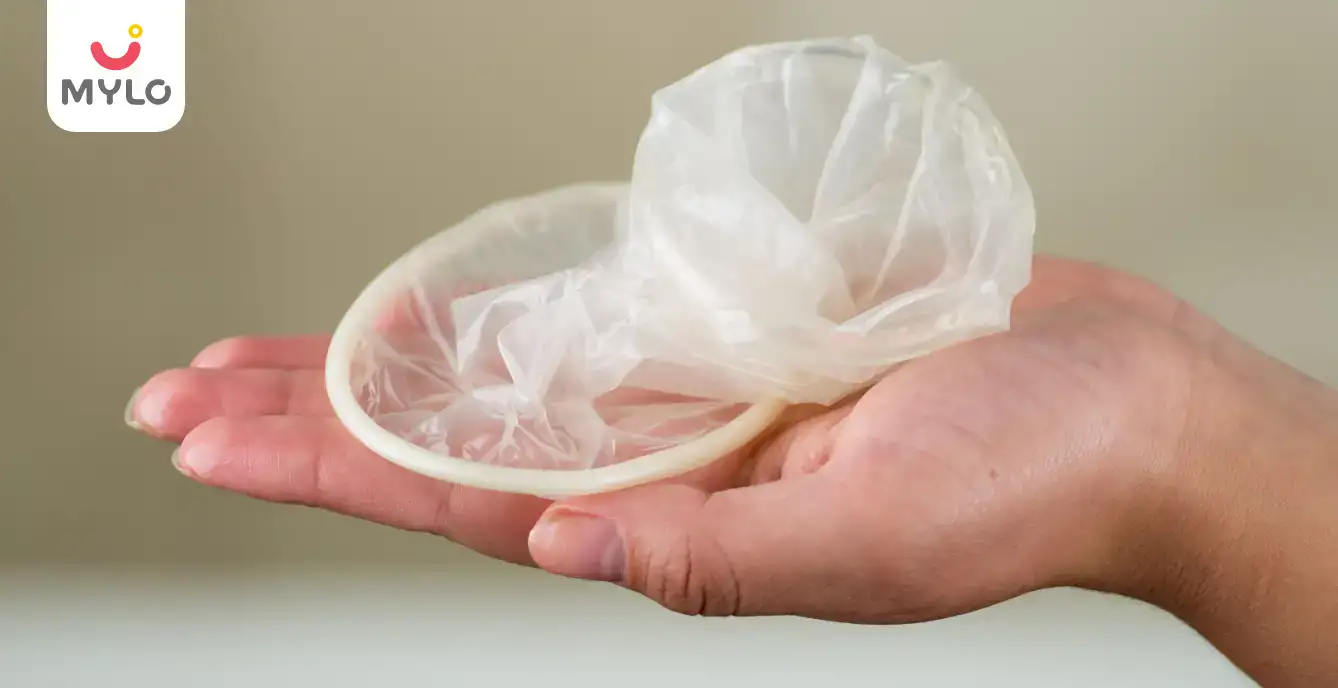
Sex Life
Where Can You Buy Female Condoms?
Illnesses & Infections
Is there anything to worry about when your baby passes urine frequently? Here are some warning signs.

Potty Training
The Do's and Don'ts of how to effectively handle toilet training for your child

Pregnancy Journey
Top 10 Precautions you must take while Celebrating Christmas and New Year During Covid
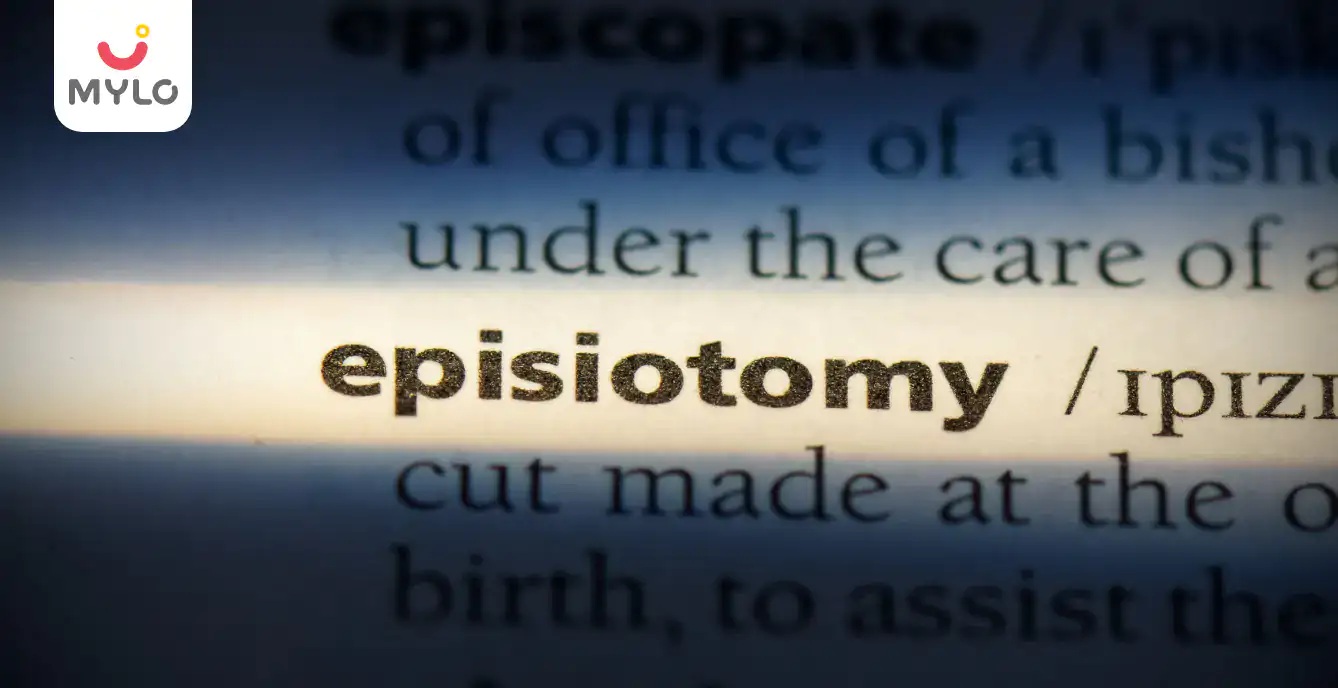
Episiotomy
Episiotomy Care: Meaning, Reasons & Risks
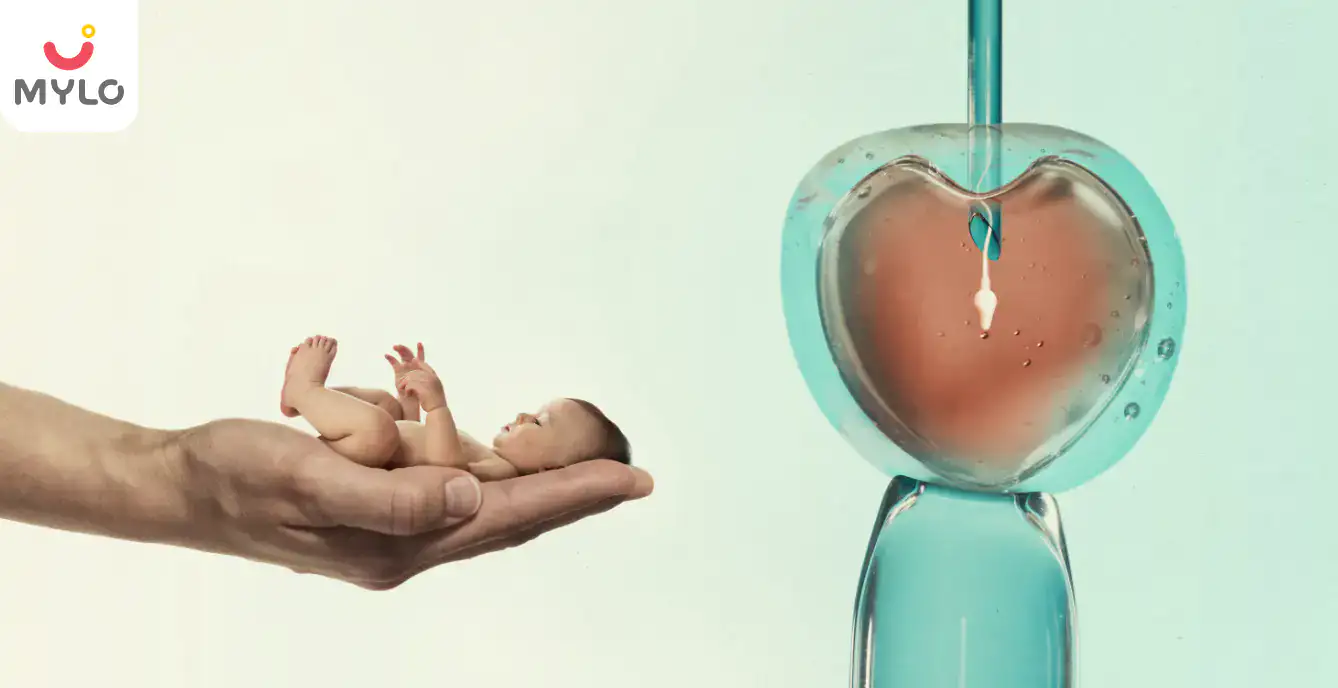
In Vitro Fertilization (IVF)
7 Most Popular IVF Myths Busted
- Is It Safe to Have Sex During Pregnancy and After Delivery?
- How to Teach Your Toddler Not to Hit?
- An Expecting Mother's Guide to Vitamins & Supplements in Pregnancy
- Use of Air Conditioners & Coolers for Newborns
- Neonatal Jaundice: Causes, Symptoms & Treatment
- Depression During Pregnancy: Causes, Risks & Treatment
- Discover the 10 Best Shows on Netflix in 2023!
- Eating Spicy Food During Pregnancy: Is it Safe or Not?
- 7 Tips to Help Your Toddler Transition From Potty to Toilet
- Embryo Freezing: Purpose & Outcome
- Exercises to Help Strengthen Weakened Pelvic Floor Muscles
- How Moms are Approaching 2023 - Mylo's Survey This Year End
- Second Trimester of Pregnancy
- Third Trimester of Pregnancy


AWARDS AND RECOGNITION

Mylo wins Forbes D2C Disruptor award

Mylo wins The Economic Times Promising Brands 2022
AS SEEN IN

- Mylo Care: Effective and science-backed personal care and wellness solutions for a joyful you.
- Mylo Baby: Science-backed, gentle and effective personal care & hygiene range for your little one.
- Mylo Community: Trusted and empathetic community of 10mn+ parents and experts.
Product Categories
baby carrier | baby soap | baby wipes | stretch marks cream | baby cream | baby shampoo | baby massage oil | baby hair oil | stretch marks oil | baby body wash | baby powder | baby lotion | diaper rash cream | newborn diapers | teether | baby kajal | baby diapers | cloth diapers |



